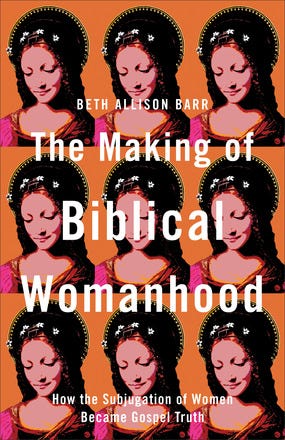As you might know, Beth Allison Barr has just published her book The Making of Biblical Womanhood, arguing that:
Biblical womanhood--the belief that God designed women to be submissive wives, virtuous mothers, and joyful homemakers--pervades North American Christianity. From choices about careers to roles in local churches to relationship dynamics, this belief shapes the everyday lives of evangelical women. Yet biblical womanhood isn't biblical, rather, it arose from a series of clearly definable historical moments.
As you can imagine, not everyone is thrilled by her book, especially within her own Baptist context. One particularly negative review comes from Thomas J. Nettles, a church history professor at SBTS.
Beth is a big girl who can speak for herself, but on the assumption that she has more critics than hours in the day, I thought I might chime in and lend a hand because I think I understand where she is coming from and perhaps something of her conservative critics.
Inerrancy and Patriarchy
Nettles is concerned by Barr’s critical comments about inerrancy. I understand the negative reaction since biblical inerrancy has been the fortress that American conservatives have created as a bulwark against liberalism and heresy. However, Barr has a legitimate grievance here. The problem is that fundamentalists and some evangelicals do not so much preach the inerrancy of the text as much as practice the inerrancy of their interpretation. Thus, to question a patriarchal interpretation of, say, 1 Tim 2.11-14, becomes tantamount to a denial of biblical inerrancy and authority. Nettles, I think, worries that denying the “plain sense” of Scripture is a de facto denial of the inerrancy of Scripture, since, in the case of 1 Tim 2.11-14, it allows what God specifically prohibits!
Let me say two things in reply.
First, it is one thing to say that “Paul was a misogynist, so send him and his wretched words to the scrap heap,” that would deny biblical authority, and that is definitely not what Barr says. It is quite another thing to reconstruct the original meaning of 1 Tim 2.11-14 in such a way that it does not sanction male domination, to point out how 1 Tim 2.11-14 has been used to justify things that even complementarians would cringe at, and to think about how we responsibly apply 1 Tim 2.11-14 in a world where domestic violence is endemic. The fundamentalist and conservative evangelical sleight of hand is to slip out the inerrancy of the text and to subtlely replace it with the inerrancy of their interpretation. Which means, in effect, that biblical inerrancy can in practice amount to the hegemony of a patriarchal culture and its male advocates. That’s Barr's point and I’m in agreement.
Second, I sincerely understand the concern to preserve the “plain sense” of Scripture, which any good Southern Baptist or Anglican would do. However, even the best of us can be very selective when we want to do this. Nettles is alarmed that Barr would deny the plain meaning of a text like 1 Tim 2.11-14 about prohibiting women from teaching or having authority over men. But, let me ask, what would Nettles say about 1 Cor 14.39: “Therefore, my brothers and sisters, be eager to prophesy, and do not forbid speaking in tongues.” There is only one command about tongues in the New Testament and it is “do not forbid speaking in tongues.” Now I don’t know Nettles’ personal view on this matter, but assuming his agreement with SBTS and IMB policy on the subject, which prohibits speaking in tongues, I would like to crack open the popcorn and cherry-cola and listen to him explain against the plain reading of the text why we should prohibit speaking in tongues.
Alas, let us all remember, those who live in hermeneutical houses made of glass should not throw ESV Study Bibles at their siblings.
Trinity and Patriarchy
In what can only be described as a “courageous” move, Nettles then defends Grudem’s eternal functional subordination christology with the remark that: “Eternal subordination of the Son of God, therefore, has nothing to do with Arianism, or Nestorianism, or Eutychianism. It is, moreover, an accurate statement of the eternal reality of three distinct personhoods within the single and simple essence of the One True God.” The relevance of this is that the Son’s subordination to the Father is sometimes thought to be an intra-Trinitarian analog for the wife’s submission to the husband. That’s the marital mileage one gets out of this eternal functional subordinated christology.
I don’t know where Nettles was for the 2016 Trinity and Gender War, but that ship has sailed, hit an iceberg, and is now at the bottom of the Atlantic. Seriously, even the most conservative complementarians now distance themselves from Eternal Functional Subordination advocates like a Republican congressman from Arkansas claiming that he has never been friends with Liz Cheney! Although I was initially sympathetic to Grudem’s view, after subsequent reflection, I became convinced that his view scores a 25.9 on the heresy-o-metre, which is all the more alarming because it normally only goes up to 10! See a 10-minute video here. True, Grudem is not an Arian, he does not think Jesus is an angelic creature, nonetheless, he does reflect a semi-Arian position with an emphasis on subordination and an aversion to eternal generation, the type of semi-Arianism that was expressed at the Blasphemy of Sirmium (a creedal statement from AD 357). For more on this see Bird and Harrower, Trinity without Hierarchy.
Okay, I could say more, I’d love to sit between Barr and Nettles and facilitate a discussion on the household codes, but that will have to be for another day.





One would have thought a church historian, Tom Nettles, would offer the expertise of a church historian.
“Alas, let us all remember, those who live in hermeneutical houses made of glass should not throw ESV Study Bibles at their siblings.” This made me lol!